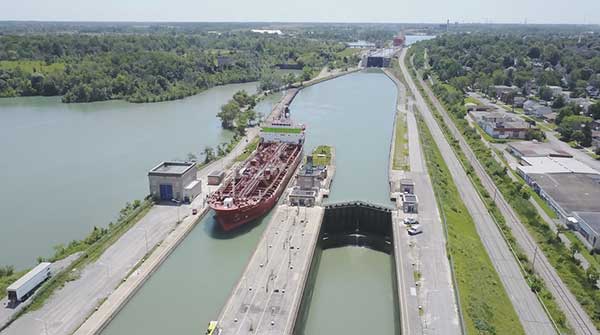Unacceptable that 360 St. Lawrence Seaway employees are holding farmers and businesses hostage
 The ongoing strike that has brought the St. Lawrence Seaway to a standstill presents a significant challenge for the agri-food economy, particularly in the eastern region of the country. Remarkably, this marks the first time the Seaway has faced such a disruption since 1968.
The ongoing strike that has brought the St. Lawrence Seaway to a standstill presents a significant challenge for the agri-food economy, particularly in the eastern region of the country. Remarkably, this marks the first time the Seaway has faced such a disruption since 1968.
Grain farmers are urging the Trudeau government to ensure uninterrupted grain transportation through the St. Lawrence Seaway during this year’s harvest season.
Approximately 40 percent of the total trade passing through the St. Lawrence Seaway comprises agricultural products. Every year, ships deliver more than 80 million metric tons of agricultural cargo, worth an estimated $40 billion on the Great Lakes-St. Lawrence waterway.
|
|
| Related Stories |
| The Metro strike could redefine Canada’s grocery industry
|
| The rising wave of labour discontent is a cost-of-living crisis
|
| Ford government must stand strong against union demands
|
Most of this trade typically occurs at this time of year, involving grains from both the United States and Canada that are meant for international export. These grains include wheat, corn, soybeans, barley, oats, and flaxseed. Should the strike persist, it has the potential to cause significant disruptions in these essential trade flows.
It’s essential to recognize that agri-food logistics operate in both directions. Food processors, particularly in Ontario and Quebec, will also be adversely affected as they rely on the timely supply of crucial ingredients to sustain their operations. Accumulated production delays could create a complex challenge for the entire agri-food supply chain.
This strike’s impact on the St. Lawrence Seaway could be more severe for our agri-food sector than the strike that affected the ports of British Columbia earlier this year. This is mainly because it coincides with the harvest season, amplifying their negative impact.
It’s often overlooked that waterways are the most cost-effective and environmentally friendly means of transportation, primarily due to their energy efficiency. With our collective focus on decarbonizing the economy, the St. Lawrence Seaway, which opened in 1959, has aged well. Replacing maritime transport with land-based alternatives would not only be daunting but also have a considerable environmental footprint.
However, given the significant political influence held by certain unions, the strike on the St. Lawrence Seaway shouldn’t come as a surprise.
Two other strikes are also impacting the agri-food sector in Canada. The first began on September 28th at the Lantic-Rogers sugar factory in Vancouver, while the second is ongoing in Toronto, where a distribution centre owned by Sobeys has been at a standstill since October 15th.
Workers have rights and deserve to be heard, but it’s crucial to recognize the far-reaching implications of a labour dispute on our logistics chain, which extends well beyond our borders.
This situation risks tarnishing Canada’s reputation and jeopardizing the quality of goods in transit. As conflicts affecting railways and ports periodically remind us, the strike on the St. Lawrence Seaway underscores the importance of considering food logistics as a vital national service.
Having 360 employees with the power to hold thousands of farmers and businesses hostage is unacceptable, especially today, with all the prevailing market uncertainties.
We often fail to realize the significance of essential elements until they become scarce or a pressing issue. Many Canadians pass by this waterway frequently without appreciating its crucial role. The St. Lawrence Seaway is indeed a gem within our logistics infrastructure, and the fact that it is currently affected by a labour dispute is cause for concern.
Our food supply chain is the backbone of our economy, full stop. It’s imperative that we acknowledge this importance and seek solutions to prevent future disruptions in our agri-food logistics, which endanger our economy and international reputation. We cannot afford to let this labour dispute prolong indefinitely.
Dr. Sylvain Charlebois is senior director of the agri-food analytics lab and a professor in food distribution and policy at Dalhousie University.
For interview requests, click here.
The opinions expressed by our columnists and contributors are theirs alone and do not inherently or expressly reflect the views of our publication.
© Troy Media
Troy Media is an editorial content provider to media outlets and its own hosted community news outlets across Canada.
